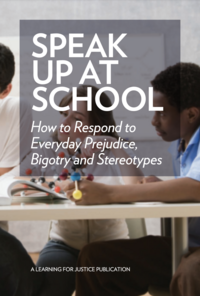You’re walking the halls, staying connected, setting high expectations and embracing teachable moments. There’s one more important step. Speak up and out against injustice.
When a slur flies, speak up. When a racist joke is told, speak up. Make sure yours is a community that does not remain silent in the face of bigotry. If school leaders say the school is a no-slur zone and then remain silent when someone calls someone else a “bitch” or a “spaz” in the hallway, the message is lost.
And speaking up is not just an administrator-to-student or teacher-to-student scenario. The climate should encourage everyone to speak up against bias and hate, at all levels and in all areas throughout the school.
“We don’t use slurs at this school,” should be a phrase everyone has at the ready.
Here are some other considerations:
Biased “Jokes” aren’t OK.
Speak up against all biased speech, even if it’s used in a “joking” manner. Interrupt whatever is happening—a conversation in the teachers’ lounge, a lesson in the classroom, someone starting to tell an obviously racist or sexist joke—and offer calm, firm guidance. “Those words hurt and anger a lot of people. We don’t use them in this classroom.”
It doesn’t have to be personal.
A powerful response to hate speech is to tie it to one’s own life—my grandmother died in the Holocaust, my brother has a developmental disability, and so on—but the word or slur need not be tied to you personally for it to be offensive. The goal is not to have students avoid using slurs in front of the people targeted by the slurs; rather, the goal is to eliminate the use of slurs no matter who might be within earshot.
Watch for nonverbal taunts, too.
If a student hurtfully mocks another’s appearance, mannerisms, mobility or ability, call the offender’s attention to the fundamental issue of respect. You might consider pulling the individual aside to address and correct such behavior, rather than embarrassing him or her in front of peers, a situation that can lead to a more defensive reaction.
Be a role model.
All adults in the school community should model respectful behavior, especially in tense or difficult moments; remember that you are leaders and mentors, not just random adults. Students are watching, and, whether they admit it or not, they take their cues from the adults around them. It’s especially powerful when one adult speaks up against another adult who has used a slur or biased language. If you ignore a colleague’s racist language, you’re tacitly indicating that it’s OK to use such language.

A Tool for Your Toolbox
Learning for Justice has written a guide, “Speak Up at School,” which offers guidance in speaking up against everyday bigotry.